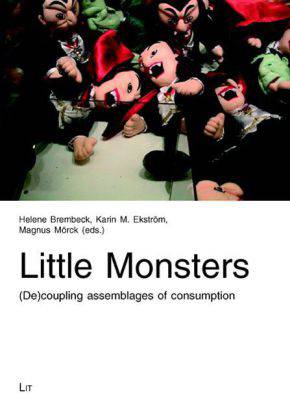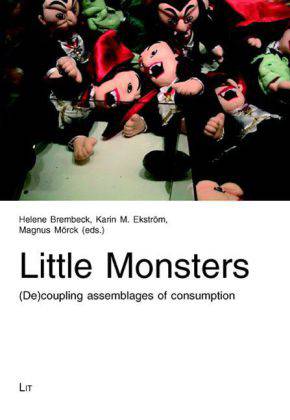
- Afhalen na 1 uur in een winkel met voorraad
- Gratis thuislevering in België vanaf € 30
- Ruim aanbod met 7 miljoen producten
- Afhalen na 1 uur in een winkel met voorraad
- Gratis thuislevering in België vanaf € 30
- Ruim aanbod met 7 miljoen producten
Zoeken
Little Monsters
(De)coupling assemblages of consumption
€ 29,45
+ 58 punten
Omschrijving
This book is about stories of consumption beyond the culture - economy divide. By bringing along Actor Network Theory, entities that in conventional approaches are taken for granted, such as consumers, goods and companies proves to be unstable assemblages of humans, goods and technologies. We meet materialistic children and parents creating an intimate moment at McDonald's, car poolers trying to get out of the grip of individual transportation, young couples imagining a home in that odd reversal of private space, the furniture store and grown men practicing a hobby so close to childhood that it causes unease. These, and other examples, line that up as our monsters, ready to act out the drama.
"Considering that actor-network theory has its roots in narratology of Algirdas Greimas (1917-1992), what better use can one imagine for it than its application to the tales of consumption! In the best ANT-ian style, the authors and the editors refuse to label people, things and phenomena with the received names. The message is: wait until the end of the story to see whether or not a big company wins over small consumers, or if behind a bewitching trademark hides a good fairy or a wicked witch. This collection challenges most ofthe common places about consumption, production, markets and consumers."
"Considering that actor-network theory has its roots in narratology of Algirdas Greimas (1917-1992), what better use can one imagine for it than its application to the tales of consumption! In the best ANT-ian style, the authors and the editors refuse to label people, things and phenomena with the received names. The message is: wait until the end of the story to see whether or not a big company wins over small consumers, or if behind a bewitching trademark hides a good fairy or a wicked witch. This collection challenges most ofthe common places about consumption, production, markets and consumers."
Specificaties
Betrokkenen
- Uitgeverij:
Inhoud
- Aantal bladzijden:
- 192
- Taal:
- Engels
- Reeks:
- Reeksnummer:
- nr. 7
Eigenschappen
- Productcode (EAN):
- 9783825802813
- Uitvoering:
- Paperback
- Afmetingen:
- 162 mm x 235 mm
- Gewicht:
- 354 g

Alleen bij Standaard Boekhandel
+ 58 punten op je klantenkaart van Standaard Boekhandel
Beoordelingen
We publiceren alleen reviews die voldoen aan de voorwaarden voor reviews. Bekijk onze voorwaarden voor reviews.






